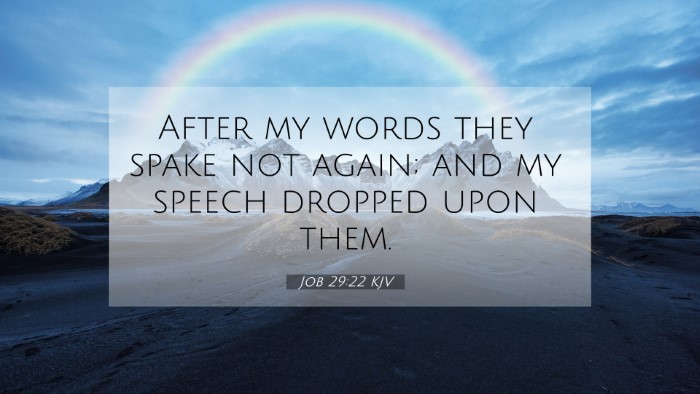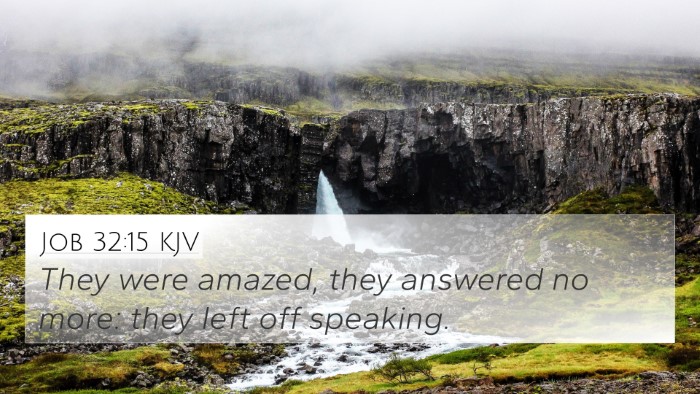Old Testament
Genesis Exodus Leviticus Numbers Deuteronomy Joshua Judges Ruth 1 Samuel 2 Samuel 1 Kings 2 Kings 1 Chronicles 2 Chronicles Ezra Nehemiah Esther Job Psalms Proverbs Ecclesiastes Song of Solomon Isaiah Jeremiah Lamentations Ezekiel Daniel Hosea Joel Amos Obadiah Jonah Micah Nahum Habakkuk Zephaniah Haggai Zechariah MalachiJob 29:22 Similar Verses
Job 29:22 Cross References
After my words they spake not again; and my speech dropped upon them.
Job 29:22 Cross Reference Verses
This section features a detailed cross-reference designed to enrich your understanding of the Scriptures. Below, you will find carefully selected verses that echo the themes and teachings related to Job 29:22 KJV. Click on any image to explore detailed analyses of related Bible verses and uncover deeper theological insights.
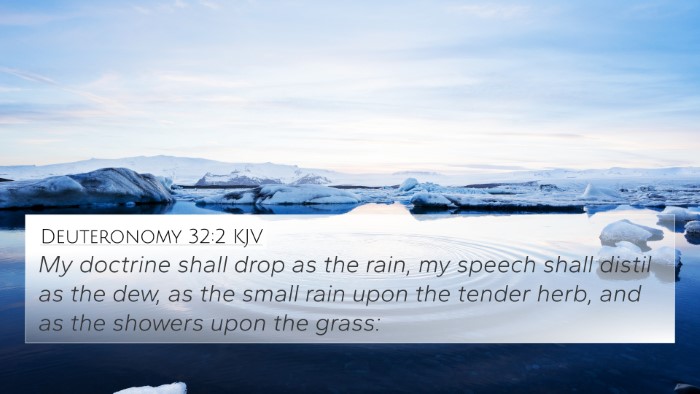
Deuteronomy 32:2 (KJV) »
My doctrine shall drop as the rain, my speech shall distil as the dew, as the small rain upon the tender herb, and as the showers upon the grass:
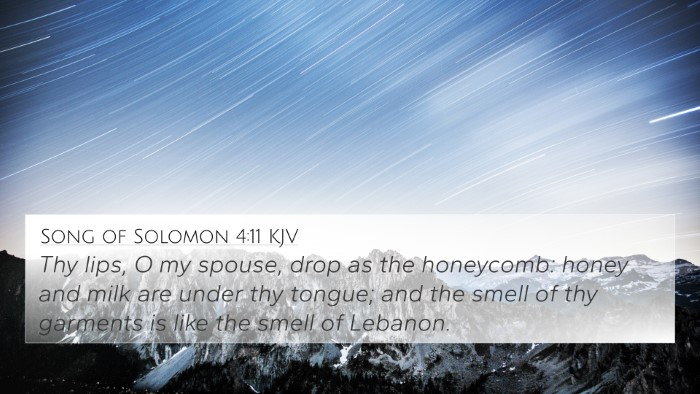
Song of Solomon 4:11 (KJV) »
Thy lips, O my spouse, drop as the honeycomb: honey and milk are under thy tongue; and the smell of thy garments is like the smell of Lebanon.
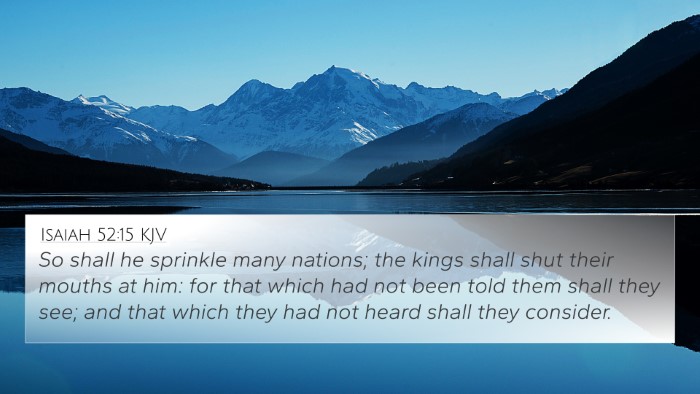
Isaiah 52:15 (KJV) »
So shall he sprinkle many nations; the kings shall shut their mouths at him: for that which had not been told them shall they see; and that which they had not heard shall they consider.
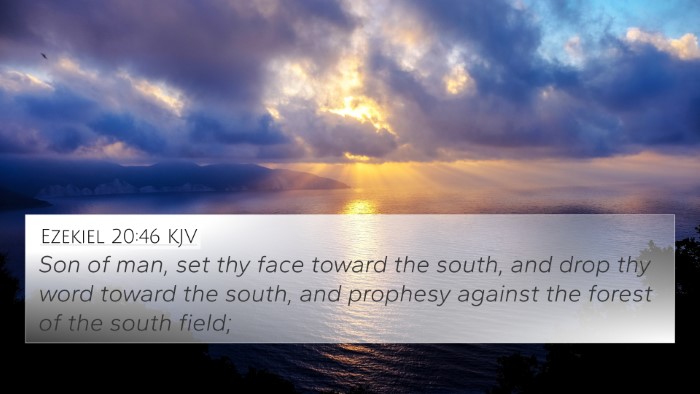
Ezekiel 20:46 (KJV) »
Son of man, set thy face toward the south, and drop thy word toward the south, and prophesy against the forest of the south field;
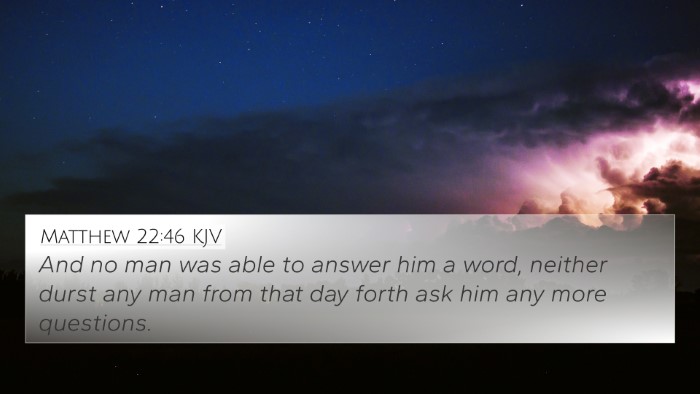
Matthew 22:46 (KJV) »
And no man was able to answer him a word, neither durst any man from that day forth ask him any more questions.
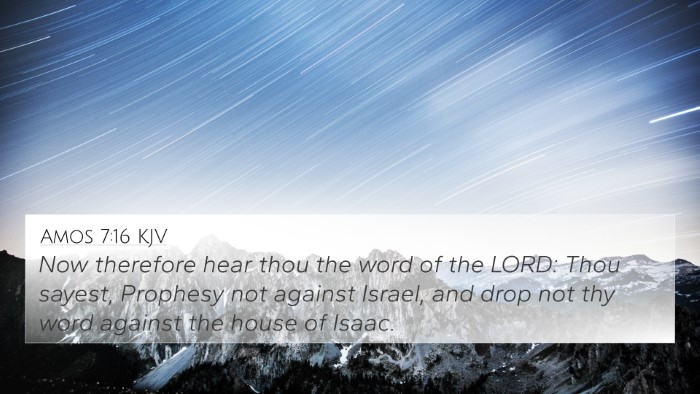
Amos 7:16 (KJV) »
Now therefore hear thou the word of the LORD: Thou sayest, Prophesy not against Israel, and drop not thy word against the house of Isaac.
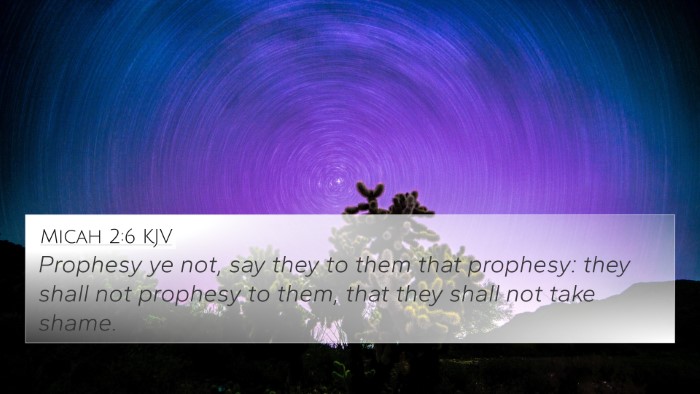
Micah 2:6 (KJV) »
Prophesy ye not, say they to them that prophesy: they shall not prophesy to them, that they shall not take shame.
Job 29:22 Verse Analysis and Similar Verses
Understanding Job 29:22
Job 29:22 states: “After my words they spoke not again; and my speech dropped upon them.” This verse comes from a part of Job's monologue where he reflects on his past. In this summary, we will delve into its meaning by combining insights from Matthew Henry, Albert Barnes, and Adam Clarke.
Contextual Background
The Book of Job is a profound exploration of suffering and divine justice. Job, a man of great integrity, finds himself suffering immensely despite his righteous life. In this verse, Job reminisces about the time when his counsel was highly valued and regarded, emphasizing the respect he once enjoyed in his community.
Commentary Insights
-
Matthew Henry:
Henry discusses how Job laments the change in his circumstances—the shift from being a revered figure whose words carried weight to being dismissed in his troubles. Job's authority as a wise man and counselor is highlighted, showing how his insights were once sought after.
-
Albert Barnes:
Barnes emphasizes the impact of Job's wisdom on others. He notes that Job was a source of comfort and guidance. When Job spoke, others listened, and this illustrates how powerful and influential his words were in shaping the lives of those around him.
-
Adam Clarke:
Clarke contributes by highlighting the sorrow in Job's reflection. He points out that Job's speech, filled with wisdom, once uplifted and guided others, but now his wisdom goes unrecognized and is overshadowed by his suffering.
Thematic Connections
Job 29:22 speaks to several themes relevant throughout the Bible:
- Respect and Authority: Job, once a figure of respect, showcases the themes of authority and influence that can change with circumstances.
- Wisdom and Counsel: It reflects the tradition of seeking wise counsel in the community, aligning with Proverbs 11:14 (“Where there is no counsel, the people fall; but in the multitude of counselors, there is safety.”).
- Isolation in Suffering: Job's lament connects with Psalm 88:18 and other verses that depict feelings of isolation in distress.
Bible Verse Cross-References
Understanding Job 29:22 can be enhanced through its connections with other Bible verses, which demonstrate similar themes or narratives:
- Proverbs 18:4: “The words of a man's mouth are deep waters; the wellspring of wisdom is a flowing brook.”
- James 3:13: “Who is wise and understanding among you? Let him show by good conduct that his works are done in the meekness of wisdom.”
- Isaiah 50:4: “The Lord God has given me the tongue of the learned, that I should know how to speak a word in season to him who is weary.”
- Proverbs 15:23: “A man has joy by the answer of his mouth, and a word spoken in due season, how good it is!”
- Isaiah 32:4: “The heart of the rash will understand knowledge, and the tongue of the stammerers will be ready to speak plainly.”
- Jeremiah 1:6-7: “Then said I: 'Ah, Lord God! Behold, I cannot speak, for I am a youth.' But the Lord said to me: 'Do not say, “I am a youth.”'
- Psalm 37:30: “The mouth of the righteous speaks wisdom, and his tongue talks of justice.”
Conclusion
Job 29:22 illustrates a poignant shift in Job's life—mirroring the feelings of many who experience loss and the erosion of their former status. By exploring this verse alongside commentaries and cross-referenced scriptures, we can gain deeper insight into the nature of wisdom, respect, and the human experience of suffering. This verse serves as a reminder of the transient nature of life and the importance of steadfastness in faith and counsel.
For those seeking to further explore the connections between Bible verses and deeply understand the themes present in the scriptures, employing tools for Bible cross-referencing such as a Bible concordance or a Bible cross-reference guide can greatly enrich your study.


